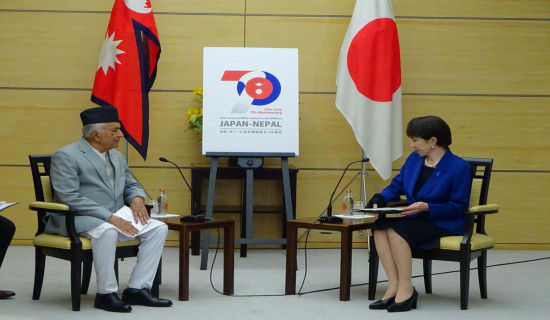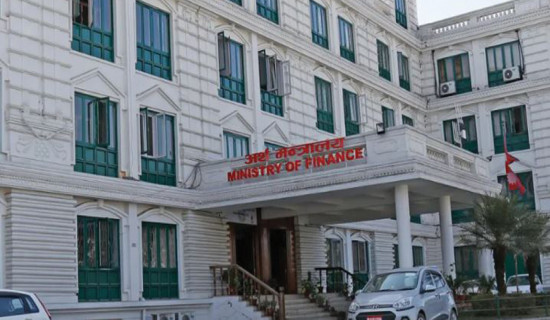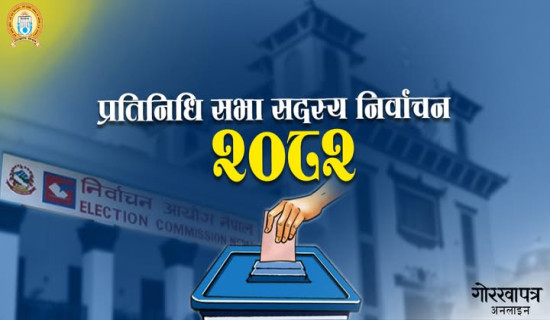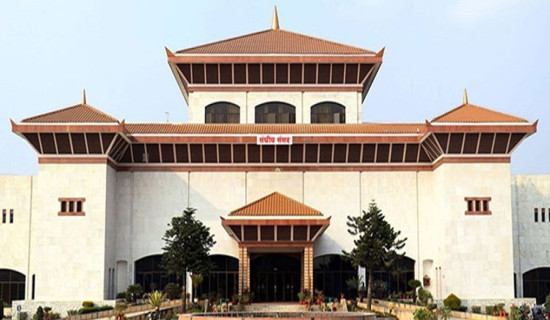- Wednesday, 4 February 2026
Informal sector workers crying for formal recognition
By Pabitra Guragain, Kathmandu, May 6: Soniya Sada, a resident of Madhesh Province, represents thousands of workers across Nepal who toil in the informal sector without formal recognition, protection, or dignity. Engaged primarily in agricultural labour, she endures extreme working conditions- from blistering heat to pouring rain—just to earn a meagre wage for day-to-day survival.
Like many women in similar roles, Soniya faces not only poor working conditions but also systemic discrimination. She is paid just Rs 200–300 per day, significantly lower than the legal minimum wage of Rs 665 for a seven-hour workday. Whenever she reports feeling unwell or shares about her menstrual cycle, she is told not to report to work, forced into unpaid leave.
“I have no official record of employment. No appointment letter, no contract. I have not been registered as a worker anywhere in government documents. If I want to report any discrimination, I have no proof,” she said.
Soniya’s story, shared during a two-day Decent Labour Campaign Conference that concluded here today, reflects the grim reality of Nepal’s informal labour sector.
Despite existing legal provisions, such as the minimum wage and labour protections, enforcement remains weak or non-existent for informal workers. As Soniya said, social security schemes remain out of her reach, and registering her work at the local level feels almost impossible. "We are nowhere in the government system."
Her voice echoed among many others who were vendors, entertainment sector workers like Dohori performers, and domestic help coming together, sharing experiences of exploitation and non-recognition at the event attended by government officials, trade unions, legal aid representatives and media.
One participant shared about how she was denied wages for five months while working for a Dohori Sanjh (a pub where folk song and dance are performed). “I worked for the Dohori Sanjh for five months, but I was neither paid nor officially hired. When I went to seek justice, I had no documents to prove anything,” she said.
A street vendor spoke tearfully of harassment at the hands of municipal police. “They treat us like offenders. They search through our bodies. We have been abused verbally and physically. Where are our rights?”
Trade union activist Baladev Tamang, who joined the discussions, stressed the need for the government to officially register informal sector workers and improve their rights. He advised workers to engage in the trade union movement so they can build collective voices and gain collective bargaining power vital tool to make the State hear their concerns.
Tamang added that though the law mandates the establishment of labour relations- even when a worker is hired for just a week- this provision has not been implemented in practice. He further argued that if workers’ rights are violated during the implementation of government policies, such issues must be reconsidered. For instance, if a local government adopts policies discouraging street vending, affected individuals should be provided with alternative livelihoods so they can continue to earn an income.
Samjhana Lamichhane, an officer from the Department of Labour and Occupational Safety who also participated in the panel, acknowledged the existing challenges. “With only 11 labour offices serving 77 districts, there is a clear lack of capacity. Federalism has yet to be truly reflected in the labour governance system,” she said, pledging to push the system to establish a three-tier government network to address the grievances of informal sector workers.
According to a survey report launched on the occasion, key issues affecting informal sector workers include non-payment and underpayment of wages, gender-based wage discrimination, lack of awareness about basic labor rights, exposure to unsafe and vulnerable working conditions, absence of health insurance or coverage for treatment expenses, domestic violence, and lack of access to social security.
The survey was conducted in six districts- Chitwan, Makawanpur, Bardia, Palpa, Parsa, and Siraha - based on the five major demands of informal sector workers. It covered a total of 3,597 workers, with the majority (71.39%) engaged in the agricultural sector. Other sectors included construction, domestic work, factories, mining, hospitality, and waste management.
According to Nepal's Labour Force Survey- 2017/18, of the total employment, 84.6 per cent is associated with the informal sectors and among those, 90 per cent are women.
During the event, it was highlighted that the rising climate crisis is impacting multiple sectors, including agriculture, where a significant number of informal workers, mostly women, are engaged. Unseasonal and flash floods, landslides, rising temperatures, and shifting climate patterns have severely affected the agricultural sector. As a result, informal labourers have been disproportionately affected, lacking access to early warning systems, adaptive skills, safety measures, coping strategies, healthcare services, and overall climate justice.
The conference was organised by Nepal Mahila Ekata Samaj, Youth Advocacy Nepal, and ActionAid, with the support of 53 other civil society organisations. (RSS)
















